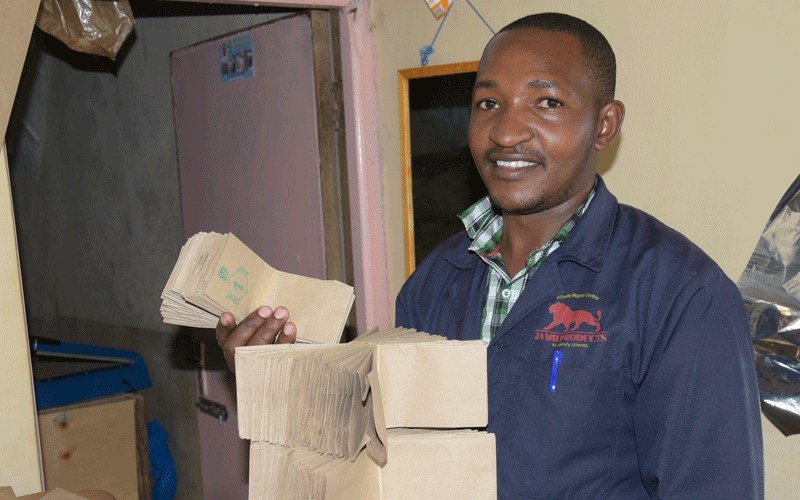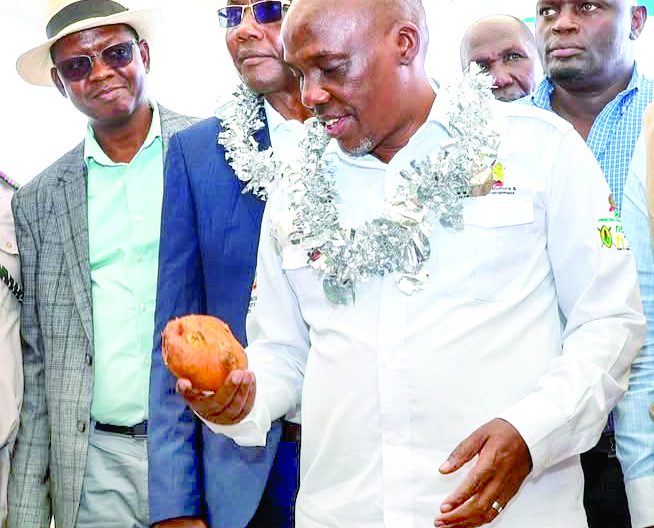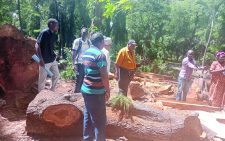Student mints cash by making khaki packaging bags

Since the onset of Covid-19 in March, thousands of businesses have closed and a number of Kenyans rendered jobless.
According to the Kenya National Bureau of Statistics (KNBS), the unemployment rate has doubled for the last three months from 5.2 to 10.4 percent.
In a recently released report, the agency indicated that at least 1.8 million Kenyans were unemployed in the months of April, May and June, due to shockwaves that the deadly virus inflicted to the economy.
As Kenyans struggled to make ends meet, Charles Kimani, a Fourth Year student at Jomo Kenyatta University of Agriculture and Technology, was struggling to venture into something that could not only keep him busy, but sustain him during the period when schools would remain shut.
The Business Information Technology student has for years yearned to venture in the manufacturing industry.
But being a student, he did not have money to start off. His quest to borrow money from his parents did not bear fruit since his father was equally struggling to survive.
Just when he was about to throw in the towel, an idea crossed his mind. He borrowed Sh1,600 from M-Shwari, a mobile banking system owned by Safaricom.
He used the funds to procure six kilogrammes of raw materials derived from timber.
The idea, he said came about as packaging bags were inadequate in the market after the government illegalised manufacturing, sale and distribution of plastic carrier bags.
New ways
Tens of millions of plastic bags, which were handed out in retail shops were blamed for polluting the environment and clogging up drainage systems.
The government introduced new packaging materials, which initially was produced in small quantity.
Kimani capitalised on scarcity of packaging bags scarcity and in April, started producing the bags. He molded using hands, glue, and which he shaped using small timbers.
The new packaging materials have become the new norm in shopping routine. They are used in packaging cereals, sugar, rice, popcorn, chips, and cookies among other items.
Kimani whose initial manufacturing quest was faced with a myriad of hurdles, ranging from lack of market, scarcity of raw materials and financial constraints, however, dared to pursue the dream.
His business was booming owing to the scarcity of packaging bags. The product was so well received in the market, and within no time, he was producing in bulk.
“Initially it was a daunting task to convince a client that my the packaging bag is modern and the best in terms of quality and pricing.
I started with just one client and using referrals, I now receive orders from different players,” he said.
After witnessing growth, Kimani employed two of his colleagues. He has also been offering training sessions on how to mold the bags, an initiative that has seen hundreds gain the skill.
Kimani, through his Jamii Products Business, has also been manufacturing envelopes, gift bags that he sells to shops, bars, chemists and supermarkets.
Speaking at their manufacturing store in the sprawling Witeithie village of Juja in Kiambu, Kimani says he has learned that some business ideas do not require huge capital but just a noble course that can offer solutions to societal problems.
“I started with an idea and I believe that should be the starting point for every youth. I had no money but the idea drove me to where I am today,” he said.
His dream is to continue empowering youths even as he is eyeing to open new branches across the country and beyond.
Budding entrepreneur
“My vision is to have branches across Africa and empower more youths through imparting the skill to them,” he said.
Budding entrepreneur has urged Kenyans to desist from destruction of trees. Trees are a major source of the raw materials in his venture.
His employees and trainees, led by Wilson Munde and Keziah Mzame say the business has been their sole source of livelihood.
“Were it not for my friend Kimani, I would be struggling up-country. From his business, I have learnt a lot and have been earning a pay that keeps me going,” said Munde.










